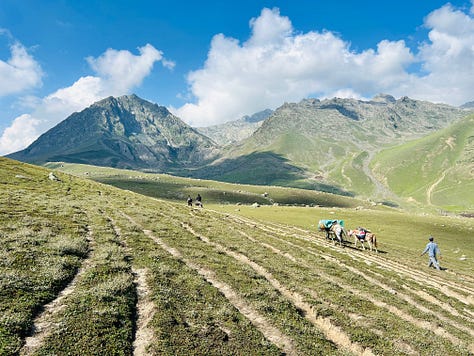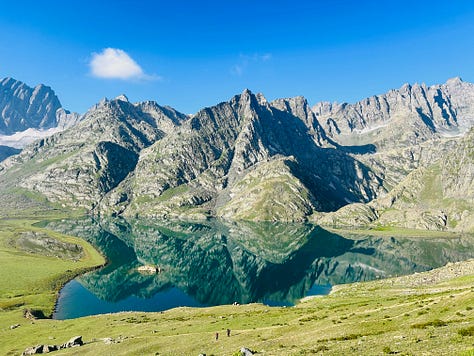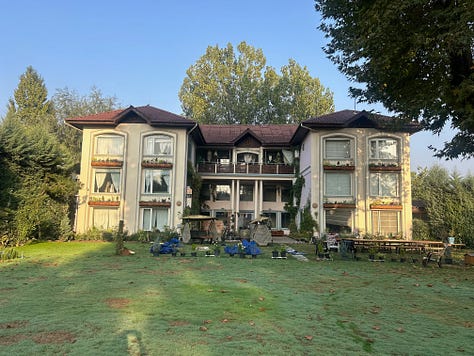Kashmir is a land often spoken about in headlines, but rarely understood beyond its beauty or conflict. In the past week, we have seen how the fabric of something that was just blossoming after years of militancy again fall back into fear and anguish. I have been an active supporter of the Kashmir ecosystem, having invested in startups there. We were working on a proposal to see how we could put the building blocks for the next 10 years. And then we hear of the attack on civilians. An act of terror that will surely set the state back. Like a founder I spoke to said: “ We know the playbook of working in adversity. We will face this one too”
Kashmir was shut to the world for 30 years. From 1991-2021. When it reopened, I was fortunate to have gone there 3 times. All 3 different reasons.
Over the three trips across two years — I got to see three different faces of Kashmir:
In 2022, as a tourist in a city just beginning to reopen after decades of isolation.
In August 2024, as a trekker walking through its breathtaking, unspoiled Great Lakes.
In November 2024, as a believer — meeting young founders building against all odds.
Each journey showed me something different. But one thread ran through all three:
Kashmir is a land that gives more than it takes.
Through its people, its mountains, its music, and its quiet courage.
This is that story. Of a place too often misunderstood.
And of why the greatest way to support Kashmir today is not pity and more social media posts, but participation.
A Tourist in a Reawakening City (2022)
When I first visited Srinagar in 2022, Kashmir was cautiously stepping out of three decades of isolation. The Shikharas floated again on Dal Lake. Tourists were back into its gardens and cafes. There was life. There was hope. But you could still sense the caution.
The military presence was visible, but the hospitality of the people was stronger — simple, kind, rooted in the land’s ancient traditions. There were eager shop owners trying to make a deal. One could see the beauty of handicrafts - From wooden artefacts, to beautiful handcrafted Pashminas. Their livelihoods depended on tourism, and you could sense the fragile new beginning everyone was trying to nurture.


Kashmir was not just reopening its hotels and gardens. It was reopening its heart.
A Trek Across Untamed Beauty (August 2024)
Two years later, I returned — not to the city, but to the mountains.
The Kashmir Great Lakes trek covers close to 87 kilometers across seven days, winding through high-altitude lakes, meadows, and passes close to the India-Pakistan border.
The week we trekked, the weather turned harsh — heavy rains, slippery trails, and the physical grind of long days. We were not alone. Over 1,000 trekkers were on the route that week, reminding me how fragile these landscapes are under the weight of tourism. (Yes, the number was 1000!)
At times, CRPF soldiers would quietly walk up to our group, checking on us, reminding us of the unseen tensions that still lace these mountains.
Tourism brings life — but it also brings responsibility, a fact we often forget.
Unlike other parts of the Himalayas, the Kashmir trail offers pure, untamed beauty.
There are no villages, no makeshift shops — only pastures, lakes, and valleys where sheep graze freely and the mountains guard their silence.
Through it all, the local mule men, porters, and guides worked tirelessly.
Hardworking, resilient, and quick to share a ‘shayari’ by the trail, they moved our supplies from camp to camp, their lives once again tied to the rhythms of tourism.
One thing struck me sharply: India has become fitter but Responsible tourism has yet to see adoption.
More people now undertake such treks. But alongside pride, there is thoughtlessness — trash left behind in a land that asks only for respect.
I also believe that as much as you can tour Kashmir, the real Kashmir beauty can be witnessed when you walk into the mountains.
We closed our trek with a soulful Sufi night, and I am grateful I had the opportunity to witness such pure art from Mohammad Noor Saheb and his group. Such experiences leave you wondering about how such pure love can be nourished in a terror torn state.









A Witness to Dreams (November 2024)
Later that year, I returned again — this time, as a believer in Kashmir’s future. As a startup founder, with my contribution to building Kashmir’s ecosystem.
I attended the launch of a new startup incubator in Srinagar, LaunchPad. We had about 50 founders, and many of the ecosystem enablers. The founders were young, ambitious, carrying invisible burdens that entrepreneurs elsewhere will never fully understand.
Building a startup is hard anywhere. In Kashmir, it demands something more: grit against uncertainty, isolation, and skepticism.
Investors are encouraging, but cautious.
Founders know that scaling in Kashmir isn’t easy.
And yet, when they startup and speak of ideas, of products, of dreams — there is hope.
Hope that refuses to die, even when circumstances are stacked against it.
Ironically, even in sectors like Pashmina — where Kashmir’s name should have led globally — there is no dominant brand yet.
But startups like Kashmir Box are changing that. They are building platforms that connect artisans to global buyers, using technology like geo-tagging to ensure fair trade and dignity.
Kashmir Box’s vision is to take Kashmir to the world!
I am also an investor in Kashmir Box, believing in their vision.
In the face of unrest, many wonder: What can we do for Kashmir?
The answer is simple:
Support its economy. Buy its crafts. Believe in its builders. Carry its stories forward.Trade - dignified, fair trade — will build what terror so often breaks. We are now in 2025. We cannot respond to terror the same way we did in 1991. As a startup ecosystem that has created so much disruption, I am sure we will find ways to make this inclusive.
The next time you think of Kashmir, think beyond beauty.
Think about participation. If each of one can buy one product from Kashmir, we would have responded to the act of terror in a much better way. If you are a corporate, consider sourcing your gifting products from Kashmir.
Each of us can find small ways to support the economy — quietly, meaningfully, and consistently. The greatest rebellion against terror is not outrage. It is building bridges so strong that no act of violence can tear them down.
Kashmir has survived being broken, isolated, and forgotten.
Now, it deserves to be believed in — quietly, consistently, powerfully. By all of us.







Share this post